Digital Marketing
Digital marketing encompasses a wide array of strategies and tactics aimed at promoting products, services, or brands through digital channels. Moreover, it leverages various online platforms, including search engines, social media, email, and websites, to reach and engage target audiences. Key components of digital marketing include search engine optimization (SEO), content marketing, social media marketing, email marketing, pay-per-click (PPC) advertising, and web analytics. Consequently, digital marketing offers businesses the opportunity to connect with customers in a personalized and targeted manner. Additionally, it allows businesses to track and measure campaign performance, thereby achieving specific marketing objectives efficiently and effectively in today’s digital landscape.

What is Digital Marketing?
The present era is the age of high-speed internet. Now, people can keep up with all the news from around the world while sitting at home. It can be said that the world is now in our hands. The business medium that has emerged by leveraging this internet system is called digital marketing. In short, digital marketing refers to the promotion of products, institutions, or brands through electronic media. The internet is closely related to digital marketing. Examples include Google, YouTube, various websites, Facebook, Instagram, LinkedIn, and other social media platforms.
Why should you do Digital Marketing?
You should invest in digital marketing for its unparalleled reach, precise targeting, measurable results, and cost-effectiveness. With billions of people online, digital channels offer a global audience, while advanced targeting options ensure your message reaches the right people. Digital marketing provides real-time analytics, allowing you to track performance and optimize campaigns for maximum effectiveness. Compared to traditional methods, it offers a higher ROI and better engagement. In today’s digital age, businesses that embrace digital marketing gain a competitive edge, reaching customers where they spend most of their time: online.
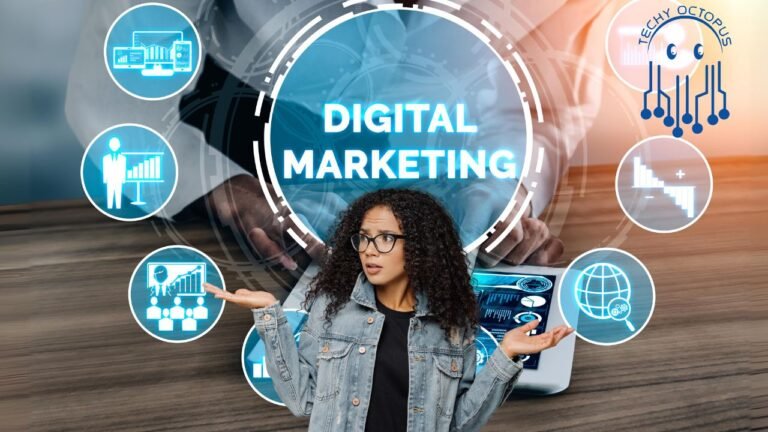
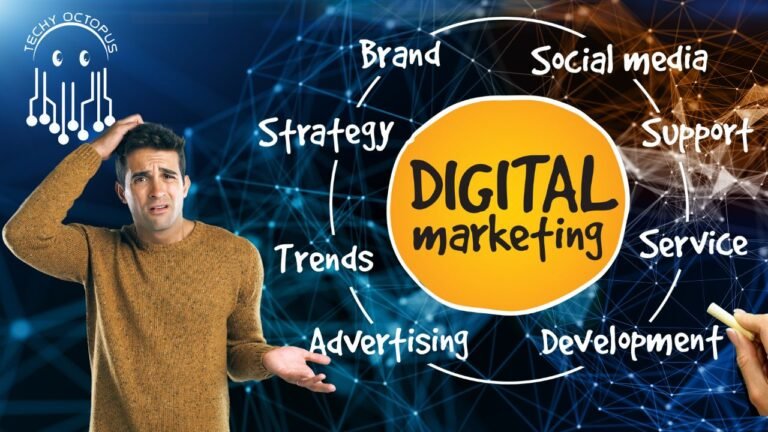
How to start Digital Marketing?
To start digital marketing, begin by defining your goals and target audience. Create a strong online presence with a website and active social media profiles. Conduct market research to understand your audience’s preferences and behavior. Develop a comprehensive digital marketing strategy that includes SEO, content marketing, social media, email campaigns, and PPC advertising. Implement tracking tools like Google Analytics to measure performance and adjust strategies accordingly. Continuously optimize your campaigns based on data and feedback. Invest in learning resources, courses, and certifications to stay updated with the latest trends and best practices. Finally, be patient and persistent, as digital marketing success often takes time and consistent effort.
Types of Digital Marketing
Digital marketing generally has many types, but six types are the most prominent. Today we will discuss these six types in detail.
- Content Marketing
- Search Engine Optimization (SEO)
- Search Engine Marketing (SEM)
- Social Media Marketing
- Email Marketing
- Web Analytics
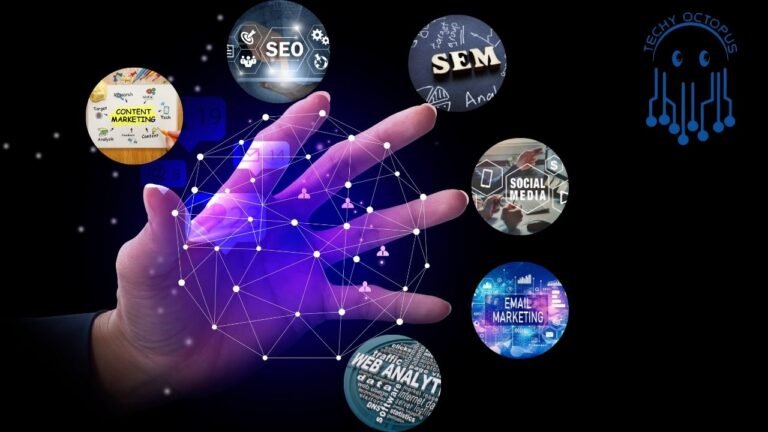

Content Marketing
Content marketing involves creating and sharing valuable, relevant content to attract and engage a specific target audience. This content can take various forms, including blog posts, articles, videos, infographics, and more. The goal of content marketing is to provide information, entertain, or solve problems for the audience, ultimately building trust and brand loyalty. By consistently delivering valuable content, businesses can establish themselves as thought leaders in their industry, drive traffic to their website, nurture relationships with prospects and customers, and ultimately drive conversions and revenue. Effective content marketing requires understanding the audience’s needs and preferences and creating content that resonates with them.
Search Engine Optimization
Search Engine Optimization (SEO) is the process of optimizing a website to rank higher in search engine results pages (SERPs). By optimizing various elements such as keywords, meta tags, and website structure, SEO aims to increase organic (non-paid) traffic to the site. The goal is to improve visibility and relevance for specific search queries, ultimately driving more targeted traffic and potential customers. SEO involves both on-page optimization (content, HTML, etc.) and off-page optimization (backlinks, social signals, etc.). Effective SEO strategies focus on providing valuable content, improving user experience, and following search engine guidelines to achieve long-term, sustainable results.


Search Engine Marketing
Search Engine Marketing (SEM) is a digital marketing strategy focused on increasing a website’s visibility in search engine results pages (SERPs) through paid advertising. SEM primarily involves Pay-Per-Click (PPC) campaigns where advertisers bid on keywords relevant to their target audience. Ads appear at the top or bottom of search results, labeled as “sponsored” or “ad.” The advertiser pays a fee each time a user clicks on their ad. SEM allows for precise targeting, instant visibility, and measurable results. It complements SEO efforts by providing immediate traffic while organic rankings are being developed, making it an essential component of a comprehensive digital marketing strategy.
Social Media Marketing
Social Media Marketing (SMM) leverages social media platforms to promote products, services, or brands. It involves creating and sharing content, engaging with followers, and running targeted advertising campaigns. SMM aims to build brand awareness, foster community engagement, and drive website traffic or conversions. By understanding the target audience and their preferences, businesses can tailor content and ads to resonate with users effectively. SMM platforms like Facebook, Instagram, Twitter, and LinkedIn offer various tools and features to reach specific demographics and achieve marketing objectives. Consistent interaction and valuable content are key to successful SMM strategies, fostering relationships and brand loyalty.
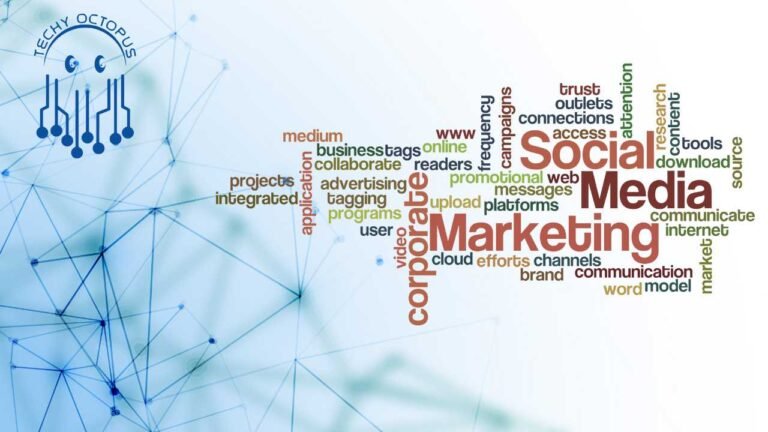
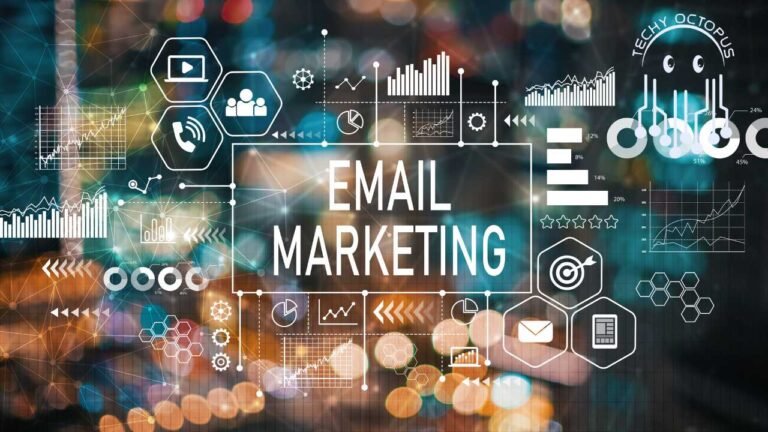
Email Marketing
Email Marketing is a digital marketing strategy that involves sending targeted emails to a specific audience. It aims to nurture leads, build relationships, and drive conversions. Email campaigns can include promotional offers, newsletters, product updates, and personalized messages tailored to the recipient’s interests. Effective email marketing relies on segmentation, personalization, and automation to deliver relevant content and maximize engagement. By providing valuable information and incentives, businesses can encourage recipients to take desired actions, such as making a purchase or visiting their website. Email marketing remains one of the most cost-effective and direct ways to reach and connect with customers.
Web Analytics
Web Analytics is the process of collecting, measuring, and analyzing data from a website to understand and optimize its performance. It involves tracking user interactions, such as page views, clicks, and conversions, using tools like Google Analytics. Web analytics provides valuable insights into user behavior, traffic sources, and content effectiveness, helping businesses make informed decisions to improve their website’s user experience and achieve their goals. By monitoring key metrics and trends over time, businesses can identify areas for improvement, refine marketing strategies, and maximize the ROI of their digital efforts. Effective web analytics is essential for data-driven decision-making and continuous optimization.
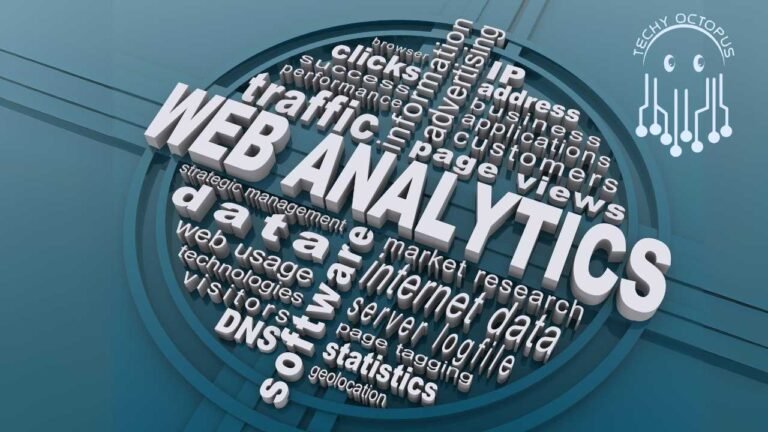
Besides these, there are numerous other methods of digital marketing. And our Techy Octopus Agency (www.techyoctopus.com) provides all kinds of digital marketing services. Thank you.
